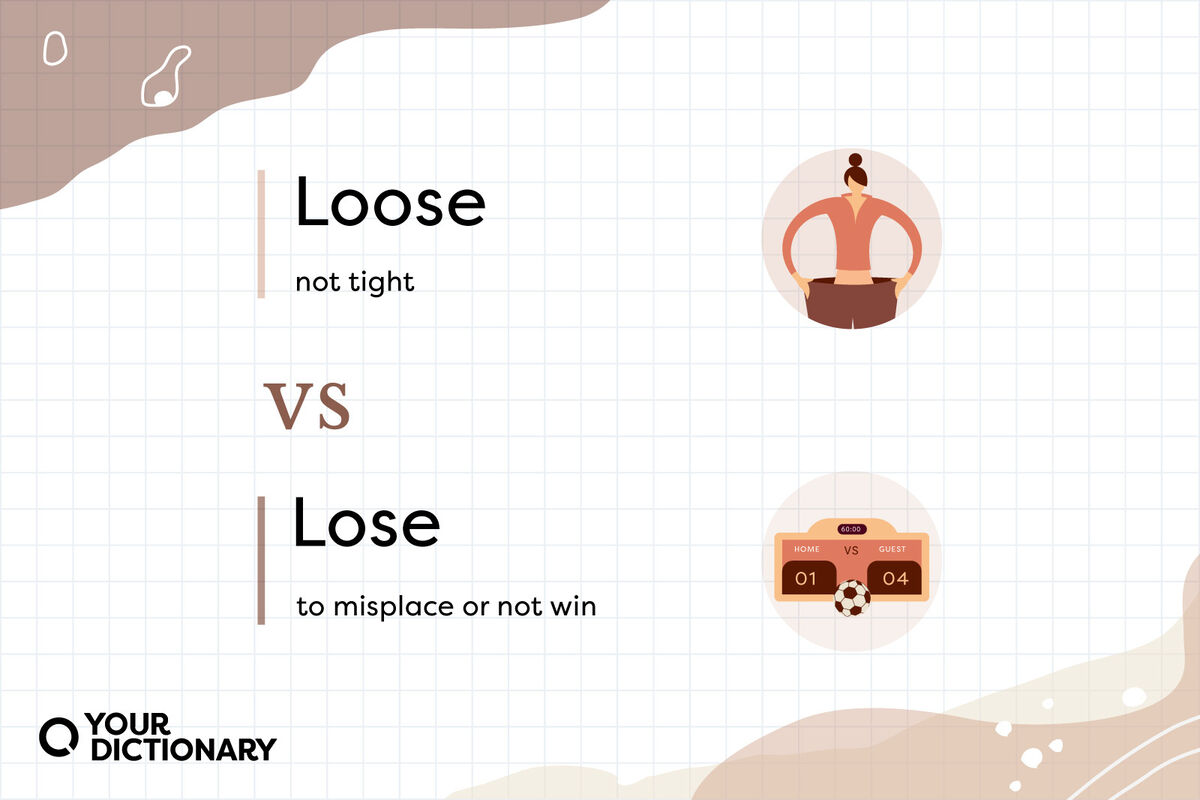
You don’t loose your keys, you lose your keys (or, if you have a nice key ring, you don’t lose them at all). It may not seem like one “o” makes a difference, but loose and lose have different origins, meanings, functions, and pronunciations — and mixing them up can really make some people lose their minds.
Loose Means ‘Not Tight’
Loose is pronounced “loo-s,” rhyming with moose. It comes from the Middle English loos, meaning “free from bonds,” and functions as an adjective to describe something that’s not secured.
- The loose dog ran up the street after jumping over the fence.
- These pants are too loose in the waist.
- Isaac wiggled his loose tooth, hoping it would come out.
- The saying “loose lips sink ships” means that gossip can be dangerous.
- All that loose change in your pocket jingles when you walk.
Loosen: To Make Something Less Tight
When you add an “n” to make loosen, it functions as a verb.
- At the end of the day, Ted loosens his tie and takes off his watch.
- Tap the sides of the pan to loosen the cake.
- You really need to loosen up and relax.
Lose Means ‘Fail to Win’ or ‘Misplace’
The verb lose comes from the Old English losian, meaning “to fail to keep” or “to be lost.” It’s pronounced “looz,“ rhyming with shoes, and it refers to something that you no longer have (as in “lose your keys”) or something that was defeated (as in “lose the game”). For example:
- Jeff wanted to lose a few pounds.
- I hate playing poker because I always lose.
- Did you lose your house key again?
- If Mitch finds out about this, he’ll lose his temper.
- Don’t lose sleep over this news — it’s really not a big deal.
Lost: Something That’s Gone
When you change lose to lost, it’s a participial adjective that modifies a noun, or a past-tense verb.
- We put up posters to find our lost dog.
- The best friends made up for lost time.
- Many sailors lost their lives in the shipwreck.
- The basketball team lost in the last ten seconds of the game.
Loss: The Process of Losing Something
When you use the noun loss, you’re describing the process of losing something, often in the context of grief. For example:
- The team’s latest loss took them out of the playoffs.
- Angie’s weight loss is really inspiring.
- We still feel a sense of loss several months after Peter’s death.
Is It ‘Loosing’ or ‘Losing’?
Many people also struggle when choosing between loosing and losing. But they’re not interchangeable — in fact, only losing is correct.
- Our company keeps losing money every quarter. (correct)
- Our company keeps loosing money every quarter. (incorrect)
- The losing team doesn't want to return to the field. (correct)
- The loosing team doesn't want to return to the field. (incorrect)
The fact that loosing isn’t a real word doesn’t stop people from using it, however. If you have a hard time telling the difference, try replacing the word with loosening. Does it make sense? If so, just add the “en.” If not, you want the word losing.
What About ‘Loser’ vs. ‘Looser’?
Both loser and looser are real words, but when you’re trying to insult someone, you probably want the noun loser. It describes someone who loses, as in winners vs. losers, as well as someone who is unpopular. For example:
- No one likes a sore loser.
- I can’t go out with Greg; he’s such a loser!
The word looser is a comparative adjective that means “more loose.” For example:
- My pants are looser today than they were yesterday.
- After getting hit in the face with a soccer ball, my loose tooth is much looser.
Like the other forms of loose vs. lose, it may not seem like that extra “o” matters much. But if you try to call someone “a total looser,” you’re the one who’s going to look like a loser.